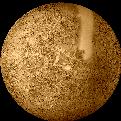
|
Mercure (crédit : NASA) |
|
GENREAL INFORMATION
The name of the planet Mercury comes from the messenger of the gods in ancient Greece (he was a hyperactive and a very fast god), the romans named it this way because it is the fastest of all planets. It is also the closest planet to the sun and the smallest of the solar system (since pluton isnt considered as one). Its radius is of 4880km, which is quite small since some satellites of other planets are larger (Ganymede(Jupiter) with 5268km and Titan (Saturn) with 5122km). Another satellite Galilean, Callisto, is the same size as Mercury. Its semi-major axis of orbit around the Sun is approximately 58 million km, in other words a bit more than the third of the distance between the sun and Earth (also called AU, astronomical unit) : the precise measure is between 0.30 and 0.47 AU in function of the distance of Mercury. The knowledge that we had of Mercury was until recently quite limited, because of the complexity of sending a probe to explore it. Mercury being so close to the Sun, the gravitational attraction felt by the probe at the approach of the planet is very strong, but it has to slow down enough to be able to land on Mercury smoothly (but not too much because otherwise it might be drown by the Sun, if so, it would be impossible for it to escape). Add to that the strong solar wind during the trip Earth-Mercury because the closer you get to the sun the more the elementary particles of the wind are energized and destructive . Finally the high speed of the probe of about 40000km/h (this is what is needed to get away from the gravitational attraction of the Earth), makes it impossible to land on Mercury without crashing, this is why it first has to tack near Venus so that it is slown down by its gravitational attraction.
|